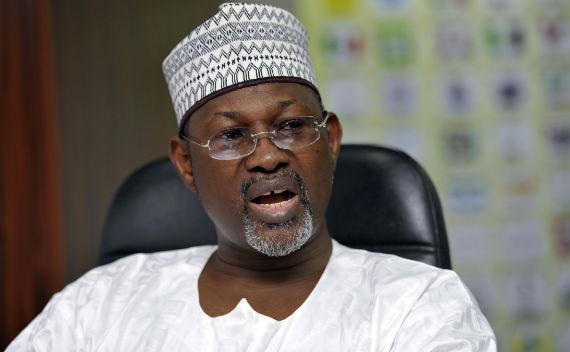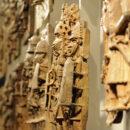Nigeria Forum: election postponement sparks rumours, doomsday scenarios and more uncertainty – By Antony Goldman


Attahiru Jega, head of Nigeria’s Independent National Electoral Commission, has found himself at the centre of fierce political controversy over the postponement of upcoming general elections.
When Attahiru Jega, Chairman of Nigeria’s Independent National Electoral Commission (INEC), announced on 7 February his decision to postpone by six weeks general elections scheduled for 14 and 28 February, he ended one debate – would elections be held on schedule – only to trigger intense speculation as to what the delay might actually herald.
Jega said the Commission had decided to postpone based on the advice of security chiefs, ahead of a planned offensive in the North East against Islamist militants. Two days earlier, he had told the Council of State, a body made of serving State Governors, former Heads of State and other senior officials, that 40 percent of voters had not yet received Permanent Voters Cards, electronic card readers had not been tested and nearly 700,000 ad hoc staff were still to be trained in the new technology.
Jega told the Council that measures were in place to resolve these difficulties. The Council urged him to consult with his Commissioners and make a final decision.
The opposition All Progressives Congress condemned the delay. It questioned the security reasons cited by Jega. It said it appeared unlikely that the army could do in six weeks to Boko Haram what it had failed to do in six years. It argued that the Commission’s independence had been compromised, following intense pressure from the Presidency.
Rumours began to circulate that opponents of the APC presidential candidate, former military ruler Muhammadu Buhari, fearing that the incumbent, Goodluck Jonathan, could not win, were preparing to crash the process. These opponents were looking to engineer a level of violence that would make elections unsustainable, prompt a coup and lead to the formation of an Interim National Government.
Speculation in Nigeria has been feverish. The army, much in the style of a football club chairman offering a ringing endorsement to a beleaguered manager shortly before giving him the sack, made an unprecedented statement. It criticised the rumours of plots, coups and interim governments as: “dangerous, condemnable and a great disservice, given the tremendous sacrifices of the army in support of democracy in our nation.”
President Jonathan used a series of media interviews to distance himself from any interference in the electoral process and to commit himself to the rule of law, insisting that the constitution made no provision for anything like an interim government.
Opposition sources began briefing that Jonathan himself might personally have no interest in an interim government, and might be prepared to concede power, but that some of his key officials were more reluctant to contemplate a Buhari victory. Those the briefers said were plotting included not Ijaw loyalists from the President’s home region in the Niger Delta in the South, but Sambo Dasuki, National Security Adviser, and Aliyu Gusau, Defence Minister.
The two former army officers, and among the most prominent Northerners in government, were key players in the 1985 coup that toppled Buhari. Dasuki was said to be the officer that had arrested Buhari. Dasuki and Gusau are also related by marriage – although they are on opposite sides of a longstanding and bitter family feud.
The APC was unhappy with the election postponement because its internal numbers suggested it was set for victory had the polls taken place on 14 February. PDP sources conceded it would have been very close – but argued that in reality it was more likely that the elections would have ended in chaos, dispute and litigation, not because of a political conspiracy but because the logistics were not in place and too many voters disenfranchised.
They suggest the security situation was used as a face-saving formula to allow Jega to preserve a veneer of independence after the NSA had publicly criticized the preparations for the elections, saying that delayed elections would be better than bad ones.
But there have also been indications of a potentially significant shift in the security environment in the North East, with Nigeria’s two neighbours, Chad and Cameroon, hitherto accused of adopting an ambiguous position on Boko Haram, now apparently fully committed to closing the back door on the Islamists by securing border areas and closing rear bases.
Nigerian army units have cleared Boko Haram from towns in Adamawa and Yobe. Spokesmen say the army, supported by air assets, is making progress in the Islamist core areas in Borno in the North East. Critics note Boko Haram has been written off by the Nigerian military many time before, and question why only the apparent approach of an election has made the army shift gear.
The army says the new offensive is the culmination of efforts to strengthen training and equipment, and point to the critical impact of the apparent shift on the part of Chad and Cameroon.
The outcome of most elections in Nigeria are typically settled well ahead of time. The last time that two genuinely national political parties competed for power was in 1965 – a frenetic contest that triggered two coups, a Civil War and 13 years of military rule.
The current uncertainty as to who might win Presidential elections now scheduled for 28 March has triggered an array of doomsday scenarios, usually centring on the losing candidate, and his supporters, either in the North or South, refusing to accept defeat. This, in turn, will trigger a coup, and the formation of some sort of interim government.
The APC and PDP each accuse the other of sponsoring such schemes. It is a reflection of the fragile nature of Nigeria’s democracy that, 15 years after the end of military rule, this is the first occasion going into an election when there has been even the semblance of a real choice. That should be a strength for Nigeria’s much criticized political class and political culture.
But, in what has always been an all-or-nothing game, it would be all the more strong were Nigeria to emerge from the elections equally with two parties, and a coherent opposition ready to fulfill an effective role rather than quickly decamp to the winning side.
Antony Goldman is Director of Promedia Consulting, which specialises in political and security risk in sub-Saharan Africa.




